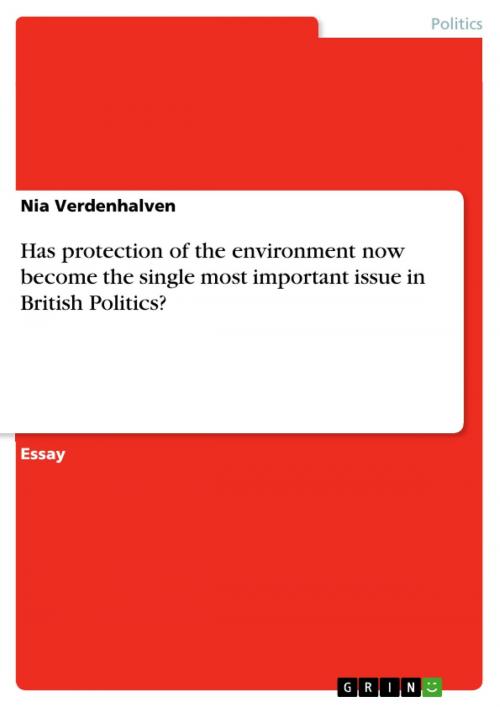Has protection of the environment now become the single most important issue in British Politics?
Nonfiction, Science & Nature, Science, Biological Sciences, Environmental Science| Author: | Nia Verdenhalven | ISBN: | 9783638631075 |
| Publisher: | GRIN Publishing | Publication: | March 31, 2007 |
| Imprint: | GRIN Publishing | Language: | English |
| Author: | Nia Verdenhalven |
| ISBN: | 9783638631075 |
| Publisher: | GRIN Publishing |
| Publication: | March 31, 2007 |
| Imprint: | GRIN Publishing |
| Language: | English |
Essay from the year 2007 in the subject Politics - International Politics - Environmental Policy, grade: A/1st mark/1, University of London, course: Themes&Issues in British Pitics since 1945, 30 entries in the bibliography, language: English, abstract: In recent years, environmental issues have gained a lot more weight within political agendas all over the world and if one believes the latest developments, Britain's main political parties have one thing in common: they all claim to have gone green. This essay will examine what is behind the sudden 'change in colour', what the real motives of Britain's 'environmentally friendly' parties really are and what the current government has done to tackle climate change. I will attempt to demonstrate that environmental consciousness in British politics, with respect to the two main parties, is used as an instrument to gain the public's sympathy and that the current government's performance in sectors, such as waste management and energy efficient housing suggests that there is still a long way to go until the protection of the environment will become an important issue in British politics.
Essay from the year 2007 in the subject Politics - International Politics - Environmental Policy, grade: A/1st mark/1, University of London, course: Themes&Issues in British Pitics since 1945, 30 entries in the bibliography, language: English, abstract: In recent years, environmental issues have gained a lot more weight within political agendas all over the world and if one believes the latest developments, Britain's main political parties have one thing in common: they all claim to have gone green. This essay will examine what is behind the sudden 'change in colour', what the real motives of Britain's 'environmentally friendly' parties really are and what the current government has done to tackle climate change. I will attempt to demonstrate that environmental consciousness in British politics, with respect to the two main parties, is used as an instrument to gain the public's sympathy and that the current government's performance in sectors, such as waste management and energy efficient housing suggests that there is still a long way to go until the protection of the environment will become an important issue in British politics.















